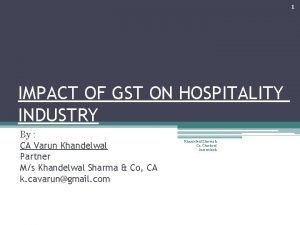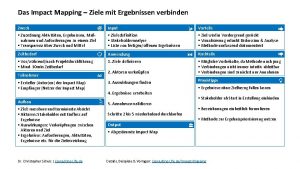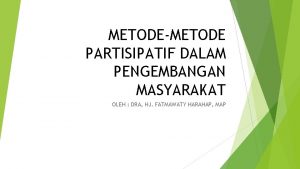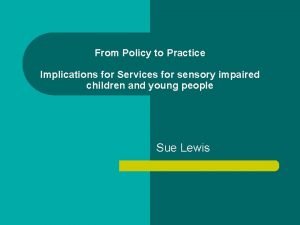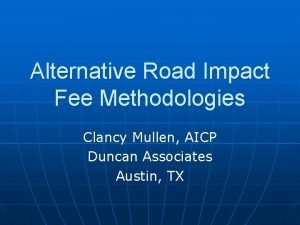Impact of E 9 Addendum to Industry Chrissie






















- Slides: 22

Impact of E 9 Addendum to Industry Chrissie Fletcher (one of two EFPIA representatives on the ICH E 9 Working Group) PSI/EFSPI 1 -day scientific meeting 28 -Sept-15 International Conference on Harmonisation of Technical Requirements for Registration of Pharmaceuticals for Human Use 1

Disclaimer (Chrissie Fletcher) • The views expressed herein represent those of the presenter and do not necessarily represent the views or practices of Amgen, the views of the other Industry representatives on the ICH E 9 working group, or the views of the general Pharmaceutical Industry. 2

Agenda • • Impact of the new E 9 addendum to Industry Feedback from EFSPI Statistics Leaders discussion High level results from international E 9 survey Key issues debated in E 9 WG (thus far!) How addendum will align with E 9 Important questions for you to consider Q&A 3

Impact to E 9 addendum to Industry • The new framework will o Improve the way we design and plan clinical trials - Objectives Estimand(s) Primary analyses Sensitivity analyses Optimise the way we conduct clinical trials - Data collection, patient follow-up o Perform primary analyses aligned to objectives - Handling of non-adherence o Perform sensitivity analyses aligned to primary analyses - Robustness of estimand(s) o 4

EFSPI Statistics Leaders feedback • Potential bias seems to be underpinning the estimand discussion. o contextualise in the rationale • Range of examples would be appreciated to better help understanding the differences between estimands (incl. use of graphics) • Defining what the role of sensitivity analyses is would be helpful • The involvement of clinicians is very important as it is understood this is not just a statistical issue 5

International E 9 survey • Conducted May-June 2015 o Thanks to those who completed it! • Collect views of current practice on what: o o o Treatment effects are being estimated in clinical trials Awareness of relevant guidelines Techniques to minimise missing data Analysis choices for primary and sensitivity analyses Comments (lots of them!) 6

E 9 survey – demographics (N=1305) 7

E 9 survey - demographics 8

E 9 survey - demographics 9

E 9 survey - demographics 10

Treatment effect being estimated in a primary analysis – outcome/event trials 11

Treatment effect being estimated in a primary analysis – ‘symptom’ trials 12

Try to collect data for patients who stop treatment but remain on study 13

Try to contact patients to prevent lost to follow up 14

Steps taken to prevent missing data 15

How much primary endpoint data attributed to study dropout 16

Methods for handling missing data in primary analyses 17

What influences your choice for handling missing data in primary analyses 18

Key issues debated in E 9 WG • Distinguishing between the various estimands • Areas of E 9 that would benefit from further clarification • Developing laymans explanations • Sharing case studies from all regions and how the choice of estimand contributed to regulatory decision making • Exploring methodologies that align to each category of estimand technical appendix 19

How addendum will align with E 9 • The addendum cannot conflict with any principles described in E 9 • The proposed framework may position some of the existing principles in E 9 in a different way • There may be areas of E 9 that require further clarification to fully align the addendum • In the spirit of E 9 the addendum will not be recommending statistical methods 20

Important questions for you to consider 1. 2. 3. 4. Does the definition of an estimand make sense? Does the proposed framework in the E 9 addendum make sense? Do you have any concerns with the framework? How much of a difference is the proposed framework compared to how you currently design clinical trials? 5. What do you see as key challenges for introducing the framework? 6. How do you think clinicians will view estimands and the proposed framework? 21

References • ICH concept paper (2014) E 9(R 1): Addendum to Statistical Principles for Clinical Trials on Choosing Appropriate Estimands and Defining Sensitivity Analyses in Clinical Trials • Lewis JA (1999) Statistical principles for clinical trials (ICH E 9): An introductory note on an international guideline. Statistics in Medicine, 18: 1903 -1904. • ICH Expert Working Group (1999) Statistical principles for clinical trials (ICH E 9). Statistics in Medicine, 18: 1905 -1942. • National Research Council of the National Academies (2010) The Prevention and Treatment of Missing Data in Clinical Trials. Washington, D. C. : National Academies Press. • EMA (2011), Guideline on Missing Data in Confirmatory Clinical Trials. • O’Neill RT and Temple R (2012) The prevention and treatment of missing data in clinical trials: an FDA perspective on the importance of dealing with it. Clin Pharmacol Ther, 91: 550 -554. • Little RJ, D’Agostino R, Cohen M, et al. The prevention and treatment of missing data in clinical trials. N Engl J Med, 367(14): 1355 -1360. • A structured approach to choosing estimands and estimators in longitudinal clinical trials. C. H. Mallinckrodt et al. Pharmaceut. Statist. 2012, 11 456– 461 • Missing Data: Turning Guidance Into Action. C. H. Mallinckrodt et al. Statistics in Biopharmaceutical Research 2013, Vol. 5, No. 4, 369 -382 • Choosing Appropriate Estimands in Clinical Trials. AK Leuchs et al. DIA Therapeutic Innovation & Regulatory Science. 2015 22
 Did you know that chrissie got
Did you know that chrissie got Mumbilli
Mumbilli Chrissie wright
Chrissie wright Suffix of friend
Suffix of friend Nbn 51-003
Nbn 51-003 Gear tooth profile diagram
Gear tooth profile diagram Escalation addendum to contract
Escalation addendum to contract Va loan intermittent occupancy
Va loan intermittent occupancy Impact of gst on construction industry
Impact of gst on construction industry Impact of gst on hotel industry pdf
Impact of gst on hotel industry pdf Impact mapping
Impact mapping Mental wellbeing impact assessment
Mental wellbeing impact assessment How humans learn
How humans learn Direct impact system
Direct impact system Impact factor hydrobiologia
Impact factor hydrobiologia Participatory impact monitoring adalah
Participatory impact monitoring adalah Intent implementation impact ofsted
Intent implementation impact ofsted Human impact on the phosphorus cycle
Human impact on the phosphorus cycle Side extrusion process
Side extrusion process 90 degree angle blood drop
90 degree angle blood drop Scope of agribusiness
Scope of agribusiness Achd impact fees
Achd impact fees Ref impact case studies
Ref impact case studies









